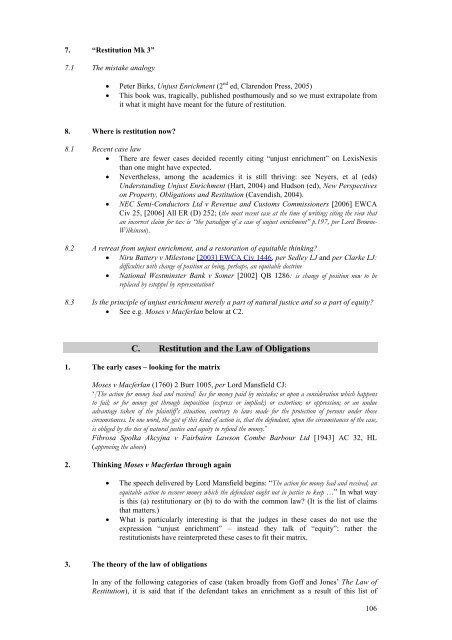Soton Equity and Trusts - alastairhudson.com
Soton Equity and Trusts - alastairhudson.com
Soton Equity and Trusts - alastairhudson.com
You also want an ePaper? Increase the reach of your titles
YUMPU automatically turns print PDFs into web optimized ePapers that Google loves.
7. “Restitution Mk 3”<br />
7.1 The mistake analogy<br />
Peter Birks, Unjust Enrichment (2 nd ed, Clarendon Press, 2005)<br />
This book was, tragically, published posthumously <strong>and</strong> so we must extrapolate from<br />
it what it might have meant for the future of restitution.<br />
8. Where is restitution now?<br />
8.1 Recent case law<br />
There are fewer cases decided recently citing “unjust enrichment” on LexisNexis<br />
than one might have expected.<br />
Nevertheless, among the academics it is still thriving: see Neyers, et al (eds)<br />
Underst<strong>and</strong>ing Unjust Enrichment (Hart, 2004) <strong>and</strong> Hudson (ed), New Perspectives<br />
on Property, Obligations <strong>and</strong> Restitution (Cavendish, 2004).<br />
NEC Semi-Conductors Ltd v Revenue <strong>and</strong> Customs Commissioners [2006] EWCA<br />
Civ 25, [2006] All ER (D) 252; (the most recent case at the time of writing; citing the view that<br />
an incorrect claim for tax is “the paradigm of a case of unjust enrichment” p.197, per Lord Browne-<br />
Wilkinson).<br />
8.2 A retreat from unjust enrichment, <strong>and</strong> a restoration of equitable thinking?<br />
Niru Battery v Milestone [2003] EWCA Civ 1446, per Sedley LJ <strong>and</strong> per Clarke LJ:<br />
difficulties with change of position as being, perhaps, an equitable doctrine<br />
National Westminster Bank v Somer [2002] QB 1286: is change of position now to be<br />
replaced by estoppel by representation?<br />
8.3 Is the principle of unjust enrichment merely a part of natural justice <strong>and</strong> so a part of equity?<br />
See e.g. Moses v Macferlan below at C2.<br />
C. Restitution <strong>and</strong> the Law of Obligations<br />
1. The early cases – looking for the matrix<br />
Moses v Macferlan (1760) 2 Burr 1005, per Lord Mansfield CJ:<br />
‘[The action for money had <strong>and</strong> received] lies for money paid by mistake; or upon a consideration which happens<br />
to fail; or for money got through imposition (express or implied;) or extortion; or oppression; or an undue<br />
advantage taken of the plaintiff’s situation, contrary to laws made for the protection of persons under those<br />
circumstances. In one word, the gist of this kind of action is, that the defendant, upon the circumstances of the case,<br />
is obliged by the ties of natural justice <strong>and</strong> equity to refund the money.’<br />
Fibrosa Spolka Akcyjna v Fairbairn Lawson Combe Barbour Ltd [1943] AC 32, HL<br />
(approving the above)<br />
2. Thinking Moses v Macferlan through again<br />
<br />
<br />
The speech delivered by Lord Mansfield begins: “The action for money had <strong>and</strong> received, an<br />
equitable action to recover money which the defendant ought not in justice to keep …” In what way<br />
is this (a) restitutionary or (b) to do with the <strong>com</strong>mon law? (It is the list of claims<br />
that matters.)<br />
What is particularly interesting is that the judges in these cases do not use the<br />
expression “unjust enrichment” – instead they talk of “equity”: rather the<br />
restitutionists have reinterpreted these cases to fit their matrix.<br />
3. The theory of the law of obligations<br />
In any of the following categories of case (taken broadly from Goff <strong>and</strong> Jones’ The Law of<br />
Restitution), it is said that if the defendant takes an enrichment as a result of this list of<br />
106













